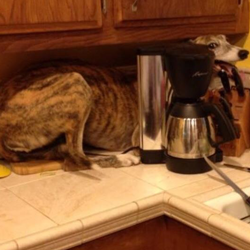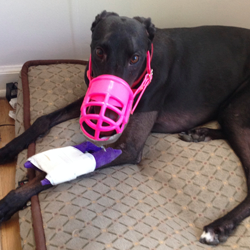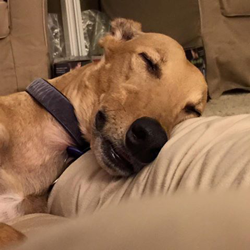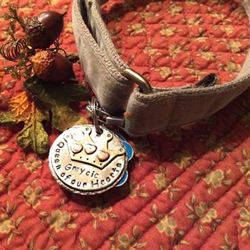YOUR GREYHOUND'S HEALTH
Fleas, Ticks, and Other Parasites ~ Including Heartworms and Hookworms
Fleas - During the summer and fall months, Southern California fights an ongoing battle with fleas and ticks. Your two alternatives are to use chemicals or to use a more natural approach. A more natural approach may include daily flea combing, frequent baths, cedar chips and/or oil in the stuffing of bedding, and sprinkling borax powder lightly on carpeting after vacuuming (allow to remain until next vacuuming when the process is repeated). There may be some holistic products or treatments, too, just ask other greyhound adopters what they have used successfully.
Although chemicals are not always the most desirable option and may be hazardous to the health of both humans and non-humans in your household, you may find they are sometimes necessary to control fleas. Make sure you read the product labels and take precautions when using any chemicals on greyhounds. Some of the new products such as Program®, Frontline®, and Advantage® involve giving your pet a monthly pill or liquid. Others are a topical application. Before using any flea/tick/parasite control chemicals, be sure to consult your veterinarian or consult with other greyhound owners. Any flea eradication program must be done in conjunction with flea control directed at the animal’s immediate environment. This involves treating the house, dog bed(s), and yard.
Ticks - Ticks live in shrubs and undergrowth, dropping onto animals (including humans) as they pass. They attach themselves and feed, filling their bodies with blood until they look like shiny beads. These insects may be carriers of diseases and can cause serious infections and even death. Inspect your dog for ticks after walks and during grooming sessions. Carefully examine your dog’s head and neck area, the ears, between their toes and under the tail. Use tweezers to carefully remove any ticks; destroy them by dropping them into rubbing alcohol. In some extreme cases you might need to use a chemical tick product.
Heartworm Disease - Though heartworms are not extremely common in southern California, this life-threatening affliction does exist in some parts of the state, primarily where there is a mosquito population. If your greyhound gets infected with heartworm disease, it is difficult and, in can be, dangerous to get rid of. GreySave has brought in a couple heartworm positive dogs that raced in the southeast, and we know from experience that many CA vets are not familiar with treatment, but our experience and research tell us that the vet must use what is referred to as the "slow kill" method. It's best to ask your veterinarian if there have been cases near you. If you travel with your greyhound out of your immediate area you may want to keep them on a heartworm preventative year round. Probably the best know of these products are HeartGuard Plus and Advantage Multi. This disease is easier to prevent than to eradicate, as these parasites entwine themselves around the arteries of the heart, lungs and sometimes the liver. They block the flow of blood causing jaundice, anemia, and eventually heart and lung failure and death.
Hookworms - Hookworms are a nasty type of intestinal parasite. They can be easily contracted in California but they are also more recent cases coming off racetracks. These little nasties are found lurking in dog parks, city parks, apartment complex dog walking areas, or any grassy or sandy areas where other dogs potty - especially in moist areas. Since hookworms have two stages in their life cycle (adult & larva) they are hard to eradicate.
Hookworms are not visible to the naked eye and can be contracted by your dog by just walking on contaminated soil or by eating the contaminated soil or feces from an infected dog. Although it has not historically been an issue for the hounds coming in from Caliente, some greyhounds may also come in from state-side tracks or farms with them... but that has changed. So when we discovered hooks might be an issue for our Caliente track hounds GreySave switched to Advantage Multi for 100% of our new hounds. Advantage Multi contains Moxidectin which works on the hooks and larvae and is the only monthly product that is advertised to prevent fleas while preventing and killing worms, including heartworms, hookworms (both stages) and other intestinal parasites. The power of this medication to kill the larva is built up over time, so it should be given for a least a year after your hound has come off the track and/or tested clean for hookworms. Please note that you can undo the benefits if you stop the medicine and/or you take your greyhound to places where hookworms thrive.
Hookworm Update - We have discovered that many vets in CA when confronted with hookworms in a greyhound will be tempted to use Panacur as that is the text book recommended medicine. That seems to work well on your garden variety hookworm. Unfortunately, the farm/track hookworms seem to have grown immune to Panacur - probably because it was the wormer of choice for many years. So after much research and recommendations from people also trying to get rid of the resistant hooks, GreySave has taken a two-strike approach that uses Advantage Multi monthly for a minimum of a year plus we use either Strongid Paste (pyrantel pamoate), Strongid Suspension or Drontol Plus (much more pricy) also once every month on a 2 week schedule half way between the Advantage Multi treatment. We recommend that our greyhounds who tested positive for either active hookworms or the hook antigen continue this pattern initially for 12 weeks and retest after that 12 weeks/3 months. If there are still hooks, even the antigens, we repeat the Strongid or Drontol regimen on top of the Advantage Multi for another 12 weeks and test again. Even after the grey has tested clear of the hooks or antigens we recommend they stay on the Advantage Multi for a least one year to prevent the reinfection.
Our Experience and Hookworm Statistics - In 2018 after we discovered the presence of hookworms from the track, GreySave did considerable research on how to kill them since we had heard from various sources that the hooks seemed to be resistant to some of the typical wormers used at the kennels. What was recommended to us is now the two step program and products we use. We give Advantage Multi once a month and then also dose with Strongid paste or Pyrantal Pamoate suspension every 2 weeks for 12 weeks. Then retest to see if cleared. If not cleared redo the process until cleared. The Advantage Multi should be continued monthly for at least a year to build up a protection from the larva.
Our 1st track hookworm case came in in February 2018 though the rest of the country has had the track hook issue for some time. Then in April 2018 a couple more came in. It was the local vets that discovered the issue and our adopters let us know. The hooks were a big surprise to us so we started researching and doing comprehensive fecal tests on the hounds the day they came in. If we did not get a fecal sample at Homecoming we sent out home fecal collection test kits. About that same time we moved to Advantage Multi. It now appears based on our fecal testing in 2019 approximately 50% of the hounds come in positive for hooks. To combat the hooks we now have a volunteer who oversees all the positive hounds. He gets the test results, sets up a personal schedule for all of his patients, and communicates with their foster homes or adopters often. So far we have tracked and treated about 80 hounds. We now have enough information to conclude that our success rate over a three or six month treatment and test cycle is very good, so we believe that what we are doing is working. That said, we do have a couple hounds that just can't shake those pesky parasites. The good news is that so far we have not had a report that any of our positive hook hounds has contaminated another dog. However, we do recommend that as a precaution all dogs in the household go on Advantage Multi. If you have ANY hook questions contact Jay Shields AKA Captain Hook.
The Costs: GreySave considers the hookworm issue serious for our hounds and the environment. To help mitigate the problem in 2019 we spent close to $6,000 for IDEXX fecal tests we did not need before, additional wormers, and to fabricate and ship fecal test kits to retest after treatment.
Other Intestinal Parasites - If at any time you see worms in your dog's stool (not all types are visible) or if your dog shows signs of anemia, weight loss, lethargy, intestinal irritation, diarrhea, including bloody diarrhea or vomiting, these could be indicators of worms. You should make an appointment with your veterinarian and be sure to bring a fecal sample with you. There are many kind of parasitic worms and some are more difficult to deal with than others. If you take your greyhound to city parks or dog parks or walk them around grassy public areas like apartment complexes you should have your hound on some form of monthly preventative.
Note: GreySave is providing 3 months of Advantage Multi to all new hounds plus Stongid or Drontal Plus for the time period the positive dogs are being treated. However, we recommend at all of our new greyhounds continue to be given Advantage Multi monthly for at least one year. You can obtain Advantage Multi from your vet. If they don't sell it, get a prescription and order it online. The reason you need a prescription for these medications is because they contain a heartworm killer, and hat could be very dangerous or deadly to any dog that has an unknown case of heartworm.
Although chemicals are not always the most desirable option and may be hazardous to the health of both humans and non-humans in your household, you may find they are sometimes necessary to control fleas. Make sure you read the product labels and take precautions when using any chemicals on greyhounds. Some of the new products such as Program®, Frontline®, and Advantage® involve giving your pet a monthly pill or liquid. Others are a topical application. Before using any flea/tick/parasite control chemicals, be sure to consult your veterinarian or consult with other greyhound owners. Any flea eradication program must be done in conjunction with flea control directed at the animal’s immediate environment. This involves treating the house, dog bed(s), and yard.
Ticks - Ticks live in shrubs and undergrowth, dropping onto animals (including humans) as they pass. They attach themselves and feed, filling their bodies with blood until they look like shiny beads. These insects may be carriers of diseases and can cause serious infections and even death. Inspect your dog for ticks after walks and during grooming sessions. Carefully examine your dog’s head and neck area, the ears, between their toes and under the tail. Use tweezers to carefully remove any ticks; destroy them by dropping them into rubbing alcohol. In some extreme cases you might need to use a chemical tick product.
Heartworm Disease - Though heartworms are not extremely common in southern California, this life-threatening affliction does exist in some parts of the state, primarily where there is a mosquito population. If your greyhound gets infected with heartworm disease, it is difficult and, in can be, dangerous to get rid of. GreySave has brought in a couple heartworm positive dogs that raced in the southeast, and we know from experience that many CA vets are not familiar with treatment, but our experience and research tell us that the vet must use what is referred to as the "slow kill" method. It's best to ask your veterinarian if there have been cases near you. If you travel with your greyhound out of your immediate area you may want to keep them on a heartworm preventative year round. Probably the best know of these products are HeartGuard Plus and Advantage Multi. This disease is easier to prevent than to eradicate, as these parasites entwine themselves around the arteries of the heart, lungs and sometimes the liver. They block the flow of blood causing jaundice, anemia, and eventually heart and lung failure and death.
Hookworms - Hookworms are a nasty type of intestinal parasite. They can be easily contracted in California but they are also more recent cases coming off racetracks. These little nasties are found lurking in dog parks, city parks, apartment complex dog walking areas, or any grassy or sandy areas where other dogs potty - especially in moist areas. Since hookworms have two stages in their life cycle (adult & larva) they are hard to eradicate.
Hookworms are not visible to the naked eye and can be contracted by your dog by just walking on contaminated soil or by eating the contaminated soil or feces from an infected dog. Although it has not historically been an issue for the hounds coming in from Caliente, some greyhounds may also come in from state-side tracks or farms with them... but that has changed. So when we discovered hooks might be an issue for our Caliente track hounds GreySave switched to Advantage Multi for 100% of our new hounds. Advantage Multi contains Moxidectin which works on the hooks and larvae and is the only monthly product that is advertised to prevent fleas while preventing and killing worms, including heartworms, hookworms (both stages) and other intestinal parasites. The power of this medication to kill the larva is built up over time, so it should be given for a least a year after your hound has come off the track and/or tested clean for hookworms. Please note that you can undo the benefits if you stop the medicine and/or you take your greyhound to places where hookworms thrive.
Hookworm Update - We have discovered that many vets in CA when confronted with hookworms in a greyhound will be tempted to use Panacur as that is the text book recommended medicine. That seems to work well on your garden variety hookworm. Unfortunately, the farm/track hookworms seem to have grown immune to Panacur - probably because it was the wormer of choice for many years. So after much research and recommendations from people also trying to get rid of the resistant hooks, GreySave has taken a two-strike approach that uses Advantage Multi monthly for a minimum of a year plus we use either Strongid Paste (pyrantel pamoate), Strongid Suspension or Drontol Plus (much more pricy) also once every month on a 2 week schedule half way between the Advantage Multi treatment. We recommend that our greyhounds who tested positive for either active hookworms or the hook antigen continue this pattern initially for 12 weeks and retest after that 12 weeks/3 months. If there are still hooks, even the antigens, we repeat the Strongid or Drontol regimen on top of the Advantage Multi for another 12 weeks and test again. Even after the grey has tested clear of the hooks or antigens we recommend they stay on the Advantage Multi for a least one year to prevent the reinfection.
Our Experience and Hookworm Statistics - In 2018 after we discovered the presence of hookworms from the track, GreySave did considerable research on how to kill them since we had heard from various sources that the hooks seemed to be resistant to some of the typical wormers used at the kennels. What was recommended to us is now the two step program and products we use. We give Advantage Multi once a month and then also dose with Strongid paste or Pyrantal Pamoate suspension every 2 weeks for 12 weeks. Then retest to see if cleared. If not cleared redo the process until cleared. The Advantage Multi should be continued monthly for at least a year to build up a protection from the larva.
Our 1st track hookworm case came in in February 2018 though the rest of the country has had the track hook issue for some time. Then in April 2018 a couple more came in. It was the local vets that discovered the issue and our adopters let us know. The hooks were a big surprise to us so we started researching and doing comprehensive fecal tests on the hounds the day they came in. If we did not get a fecal sample at Homecoming we sent out home fecal collection test kits. About that same time we moved to Advantage Multi. It now appears based on our fecal testing in 2019 approximately 50% of the hounds come in positive for hooks. To combat the hooks we now have a volunteer who oversees all the positive hounds. He gets the test results, sets up a personal schedule for all of his patients, and communicates with their foster homes or adopters often. So far we have tracked and treated about 80 hounds. We now have enough information to conclude that our success rate over a three or six month treatment and test cycle is very good, so we believe that what we are doing is working. That said, we do have a couple hounds that just can't shake those pesky parasites. The good news is that so far we have not had a report that any of our positive hook hounds has contaminated another dog. However, we do recommend that as a precaution all dogs in the household go on Advantage Multi. If you have ANY hook questions contact Jay Shields AKA Captain Hook.
The Costs: GreySave considers the hookworm issue serious for our hounds and the environment. To help mitigate the problem in 2019 we spent close to $6,000 for IDEXX fecal tests we did not need before, additional wormers, and to fabricate and ship fecal test kits to retest after treatment.
Other Intestinal Parasites - If at any time you see worms in your dog's stool (not all types are visible) or if your dog shows signs of anemia, weight loss, lethargy, intestinal irritation, diarrhea, including bloody diarrhea or vomiting, these could be indicators of worms. You should make an appointment with your veterinarian and be sure to bring a fecal sample with you. There are many kind of parasitic worms and some are more difficult to deal with than others. If you take your greyhound to city parks or dog parks or walk them around grassy public areas like apartment complexes you should have your hound on some form of monthly preventative.
Note: GreySave is providing 3 months of Advantage Multi to all new hounds plus Stongid or Drontal Plus for the time period the positive dogs are being treated. However, we recommend at all of our new greyhounds continue to be given Advantage Multi monthly for at least one year. You can obtain Advantage Multi from your vet. If they don't sell it, get a prescription and order it online. The reason you need a prescription for these medications is because they contain a heartworm killer, and hat could be very dangerous or deadly to any dog that has an unknown case of heartworm.
For your convenience we have put together a comparison of common flea, tick, and wormer products that have been used on greyhounds. The products used by GreySave on our homecoming events (after heartworm testing) are Advantage Multi, Strongid, Cestex ands Simparica.
Brief comparison of flea, tick and worm control and/or preventative products for dogs – compiled by GreySave and used by some GreySave adopters. Please note: yearly or sometimes more often a new product to treat fleas, ticks & worms comes on the market, but not all may be safe for greyhounds. It is best to check with other greyhound experienced individuals to confirm that the product has been used safely on greyhounds.
BEFORE YOU GIVE YOUR DOG ANY MEDS THAT KILLS HEARTWORMS SYOUR GREYHOUND NEEDS A TEST TO MAKE SURE THEY DO NOT HAVE HEARTWORM DISEASE, OTHERWISE, A PRODUCT WITH A HEARTWORM MEDICINE COULD SEVERELY DAMAGE YOUR GREYHOUND'S HEART!
|
Product name
Advantage Multi
Topical = Imidacloprid 400mg & Moxidectin 100mg Trifexis
Pill form Spinosad 1620 mg & Milbemycin oxime 27mg Sentinel
Pill form - Milbemycin Oxime 23mg Lufenuron 460mg Revolution
Topical – 360 mg Selamectin Iverhart Plus
Pill form = Ivermectin 272 mcg & Pyrantel 227 mg Heartguard Plus
Pill form = Ivermectin 272 mcg & Pyrantel 227 mg Simparica
Pill form - Sarolaner Comfortis
Pill form – Spinosad 1620 mg Frontline Plus
Topical = Fipronil 9.8% & (S)-methoprene 8.8% |
Flea & tick coverage
Fleas including flea infestations
does not kill ticks Controls fleas
does not kill ticks Controls flea population does not kill ticks Fleas & flea eggs & ticks
Not applicable
Not applicable
Fleas, including flea infestations & multiple kinds of ticks
Kills fleas, prevents and treats flea infestations
Fleas, flea eggs, flea larvae, ticks & lice
|
Worms covered
Prevents heartworm disease, kills treats & controls hookworm, roundworm & whip worms and hook larva if used over time
Prevents heartworm disease, treats & controls adult hookworms, roundworms & whipworms
Prevents heartworm disease, controls adult hookworms, removes and controls roundworms and whipworms
Prevents heartworm disease, kills roundworms & hookworms
Prevents heartworm disease, treats and controls roundworms & hookworms
Prevents heartworm disease, treats and controls roundworms & hookworms
Not applicable
Not applicable
Not applicable |














